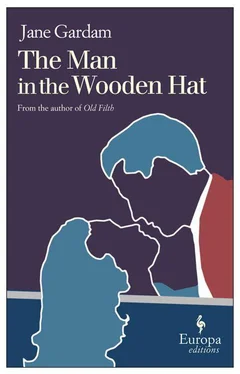“Well, he was here as a boy,” said the arthritic, amazed that the whole world did not know. “One day there’ll be a statue.”
She found her way to the garden and there were fruit bushes and a cucumber frame, and over the fence to the right an old woman with a florid face was watching her.
“Good morning,” she said. “I am Da-lilah Dexter. You may have heard of me. I am an actress but equally concerned with gardening. And I hear that you have just married Edward.”
“How ever—?”
“News flies through eighteenth-century walls. We heard you arrive last night but then you were gone. I suppose he’s off to his Chambers?”
“Yes. We’re just back—”
“From a long honeymoon. It will be hard to adjust. I suggest you come in for hot cocoa and to meet Dexter.”
“I don’t think. .”
“I will put on the cocoa and leave open the front door.”
“This,” Delilah said, pointing, “is Dexter.”
The house was like the green room of a small theatre, the sitting room apparently immense since the wall opposite the windows (hung with roped-back velvet like proscenium arches) was covered by a gold-framed mirror that reflected an older, softer light than was real. The mirror had a golden flambeau at either side of the frame where fat wax candles had burned to the last inch. The looking-glass reflected a collapsed man in a black suit, his legs stretched out before him on a red velvet chaise longue that lacked a leg. His face was ivory. He waved an exhausted greeting.
“Dexter,” announced his wife, “is also an actor. A fine actor, but in his later years he only plays butlers.”
“How interesting. .”
“Butlers have been our support for years. Unfortunately the new drama is uninterested in butlers. It is all tramps and working-class women doing the ironing. But still, here and there, Dexter finds a part, or rather directors find a part for him. He’s the ultimate butler. He very much favours the Playhouse where they still tend towards the country-house comedy, and long runs. At present he is in a play where his part ends with Act Two and so he gets home for supper. They let him off the final curtain.”
“I hope always to be let off the final curtain,” said Dexter. “And as I always wear black I need spend no time in the dressing room. I can leave this house and be on stage in nine minutes.”
“But if you fell over in the street?”
Both actors looked at Elisabeth with disdain.
“We are professionals,” said Delilah. “We can dance on a broken leg. If Dexter should get late, he could borrow Edward’s bicycle. I’ll top up your cocoa with a little green chartreuse.”
When Elisabeth had opened every window in the house and propped open the front door with the bicycle, she followed Edward’s telephone wire under a cushion and phoned the Westminster Council about the rat. Then she got busy with the labour exchange and went across to Mozart Electrics about a cleaning agency. At the National Provincial Bank on the corner she opened an account and she attacked the gas showrooms to dare them not to replace the geyser. “They’ll not show up for a month,” said Delilah Dexter, but someone came round in an hour and stayed until hot water crept forth. Elisabeth found a saucepan, cleaned out spiders and ate kippers.
“They were very good,” she told the greengrocer’s wife.
“Yes, They’re from Lowestoft. These are Lowestoft kippers — we’ve gone there two weeks’ holiday for twenty-seven years, even in the war. You’ll be all right, they keep. We’ll be back there in a few months and I’ll get you some more. We don’t like change. We’re here.”
Edward, returning uneasily — and late — that evening to the Grosvenor, found no sign of his wife or his luggage. He walked back dispiritedly to Ebury Street to find every light in the house ablaze, every window open and a smell of kippers noticeable as far away as Victoria Station. His wife on his doorstep, arms akimbo in a borrowed overall, was deep in conversation with the fruit shop, and Mr. Dexter was making his way solemnly down the street dressed as a butler.
“The end of Act Two,” said Dexter, raising his bowler hat.
Well, yes. There is money,” Edward agreed. “Yes.” (Reluctantly.) “The fees do begin to roll in at last. But I feel we should not be rash.”
“Decorate white throughout,” said Betty. “The electric shop knows a couple of men down the mews. Then the new place, Peter Jones in Sloane Square, it’s reopened. It’s the place for all carpets and curtains. And furniture. Do you think it’s time we had a car?”
“Good God, no!”
“It could stand in the road.”
“It would need lights at night.”
“We could have a wire through the sitting-room window. On a battery. They all do.”
“It’s against the law. It’s carrying a cable across the public highway. One day the whole street will catch fire.”
“The fruit shop van stands outside all the time. By the way, he says he’ll deliver free.”
“Since he’s only next door. .”
“And Delilah Dexter’s going to help me with the interior decoration.”
“Which one is Delilah Dexter?”
“Married to the singing butler. They know you. Leave it all to me, but I need a bank account of my own. And something to put in it.”
“That,” said Filth, “is, I imagine, usual now.”
Delilah was very decisive when the bank account was in place. The whole house was to be the very purest white, like Lady Diana Cooper’s used to be in the Thirties, though she wasn’t, Delilah found, the purest white herself. Nor was England. “And we’ll have one sitting-room wall in simulated black marble, surrounding the white marble chimney piece. And crimson and silver brocade striped curtains. The sofa and chairs are good — Edward says they came from Lancashire but can’t remember how. They can be loose-covered in pale citron linen. And the carpet should be white. Fitted to the walls. And thick and fluffy.”
“I’m not sure that Edward. .”
“Oh, and silver candlesticks with black candles on the chimney piece with a tall looking-glass behind them. It happens that I have some silver candlesticks somewhere. We used them in the Scottish Play. Now, let me go ahead.”
“The Chambers want to give us a wedding present,” said Filth three weeks later, standing outside the sitting-room door and wondering whether to remove his shoes. “This white carpet. It’s where we eat ?”
“Oh, we’ll eat in the kitchen now. It’s beginning to be considered O.K..”
“I’m sorry. I couldn’t eat in a kitchen.”
“It’s not like it used to be. It will be clean.”
“The Chambers,” he said, in his bony stockinged feet, “want to give us an armchair. I told them we have one coming from the East.”
“Dear love,” she said. “We’ll not see that again.”
Filth looked sad.
“What’s wrong?”
“I remember your face when I bought it. Ecstasy.”
“Oh, I was being childish. Look, tell them we want a black chair from Woollands of Knightsbridge. I’ve seen it in the window. It has cut-out holes in it like Picasso. It sprawls about. It will add a revolutionary touch.”
When the chair arrived it still had the price tag attached. Twenty-two pounds!
“Crikey,” said Betty. “Your Chambers must like you. We’d better give a party.”
“I never give parties,” said Filth. “They know me.”
“They don’t know me,” she said. “Come on. I’ll make a list. I’ve done coq-au-vin for dinner, all red gravy. It’s in the kitchen.”
Читать дальше












